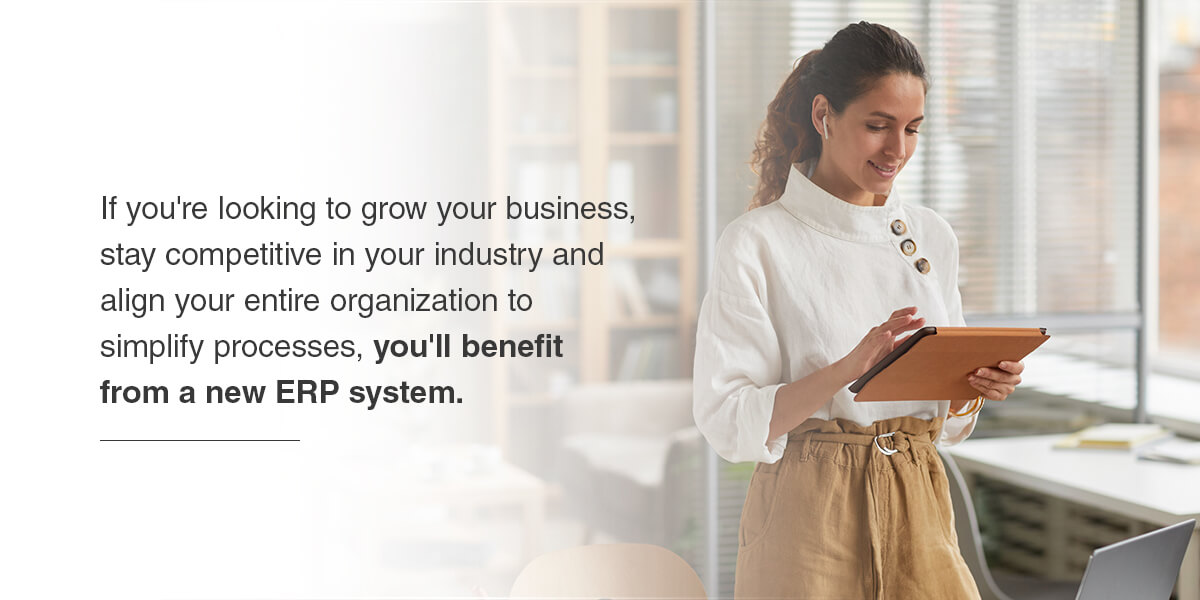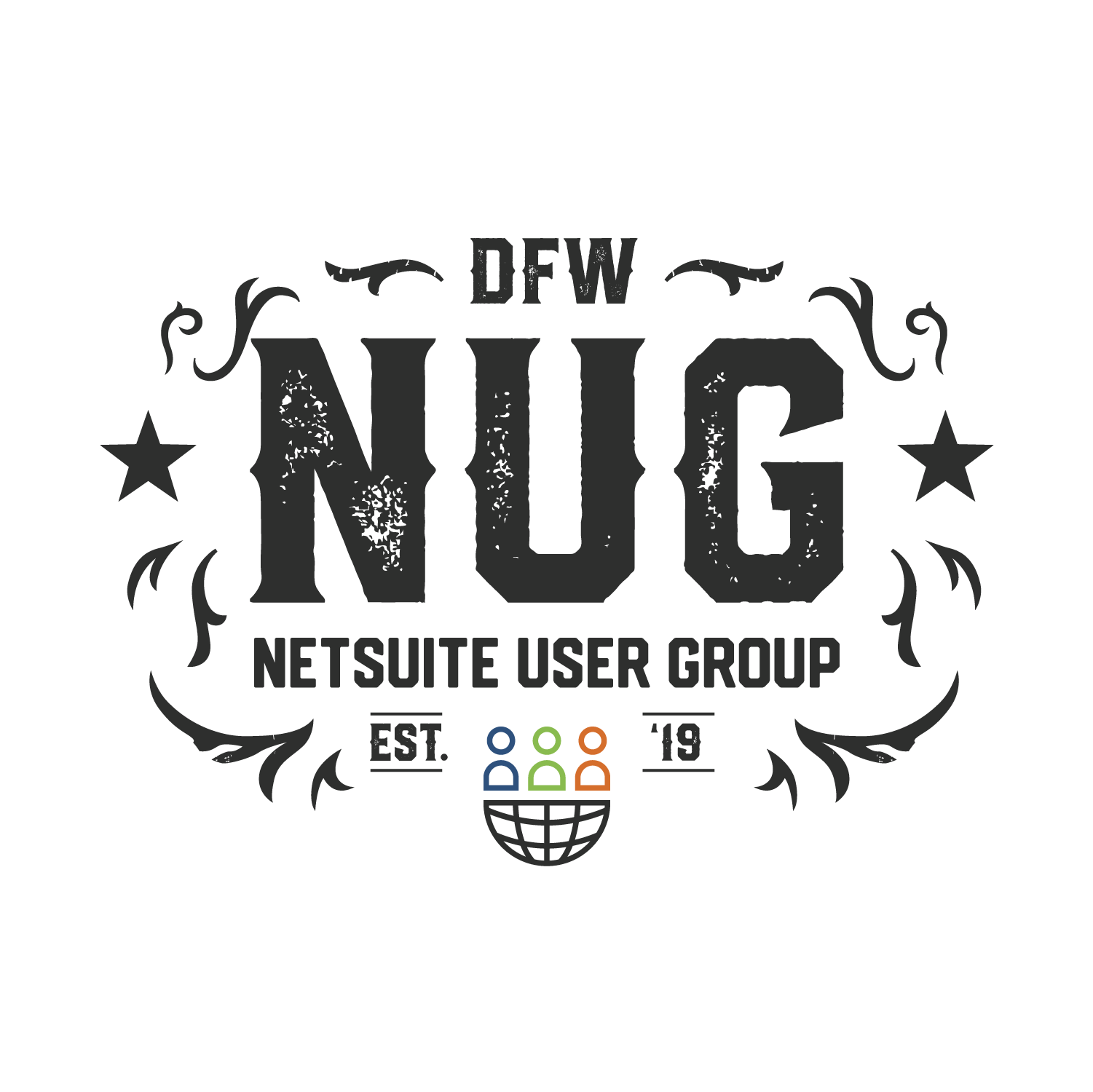
An Enterprise Resource Planning (ERP) system is a shared database that supports multiple functions of different business units within an organization. For example, instead of having separate databases and systems for departments like human resources, accounting and inventory management, ERP systems provide one database for all departments to use collectively. This collectivity breaks down barriers between departments and allows employees to work more efficiently with each other.
Knowing how to pick an ERP system is vital in finding the right vendor and system for your business. Consider our ERP requirements checklist for software selection process best practices.
- Identify Your Business Needs and Requirements
- Questions to Ask ERP Vendors
- Technical Validation
- Implementation Considerations
Identify Your Business Needs and Requirements
To begin, it's best to internally evaluate your business's processes and identify the need for ERP system solutions.

Why Do You Need an ERP System?
Consider why your business needs an ERP system. Define what business problems or processes you're trying to solve or improve so you understand why you need an ERP system. If you're looking to grow your business, stay competitive in your industry and align your entire organization to simplify processes, you'll benefit from a new ERP system.
Evaluate Needs and Requirements
Evaluate what your business needs and requirements are and how ERP software products will fit into your existing infrastructure. Determine what your business needs to operate so you can define areas for improvements or upgrades. Define what requirements are vital to job functions across departments and what functions are convenient but not necessary for task completion. These steps will help you narrow down a list of specific requirements you need an ERP system to have in order for it to benefit your company.
To help focus these conversations with your team, ask yourself:
- What manual processes could you potentially automate?
- If you have a current ERP system, what is outdated and what works well with your business systems?
- What areas of your business have unreliable reporting?
- Do you have other systems that will need to be integrated with a new ERP system?
Questions to Ask ERP Vendors
Comparing potential ERP vendors requires dedicated research to ensure you find the perfect fit for your business. One of the first steps in the vendor selection process is to ask vendors the following questions to help narrow your search:
- How experienced are you with businesses like mine in terms of industry, size and products or services?
- How will adding additional users or features down the road affect the ERP price?
- Is the software customizable and can it be integrated with my other systems?
- What will the system cost? Are there additional hidden fees?
- How do you separate your firm from your competition?
- How often do you update and upgrade your software?
- What types of support and training do you offer?
You should also ask your potential vendors for client testimonials. See what others are saying about the vendor to get a sense of their reputation and learn what their satisfaction record is like.
Technical Validation
Once you narrow the list of potential vendors, find out exactly what they can do for you. Submit requests for information (RFIs) that outline your short-term and long-term goals as well as your list of ERP requirements. Most vendors will tell you they can meet all your needs because they want your business. Make sure you're finding out exactly how they plan to address your requirements. This request is also your chance to submit requests for proposals (RFPs) and requests for quotes (RFQs) to get the full picture.
The next ERP selection step is to ask for demos. Demos give you and your team the opportunity to get an in-depth look at the functionality of an ERP system, thoroughly evaluate the system and get proof that the vendor can meet your requirements before you settle on a system. Allow your team to ask questions and evaluate the software's ability to meet your business needs. If a requirement is not demonstrated, make note of it — don't just take the vendor's word for it.
During this process, you may consider providing potential vendors with a demo script so that your demo can be tailored to your unique business needs. Offer them actual data to use so your demo is meaningful and realistic. Because your company is unique, your demo should be as well. Be mindful of the time and effort a vendor puts into creating your demo. A standard sales demo means the vendor didn't show adequate interest, which will likely result in a lack of time or effort put into your ERP implementation or future support.
Implementation Considerations
Finding a vendor and system that adequately meets your needs is only half the battle. The implementation process for an ERP system can be time-consuming. Make sure you're also considering the vendor's time frame for implementation.
Timing For Your Business
A difficult — although necessary — question to ask yourself is whether or not this is a good time to be taking on this project. There may be no perfect time, and the answer to this question will largely depend on your team and their willingness to take on a new ERP system. Some times are better than others, like after a merger or when deciding between an expensive upgrade for your current system compared to a new system.
Understand the Timeline for Implementation
Some vendors may offer an estimated time frame for implementation. Ensure that all the activities required for installation and testing are included in the timeline so you can fully understand the time and resource commitments required to make the project successful. The plan should include time for data migration, workflow design, key organizational change management activities and multiple test iterations.
Vendor Implementation Assistance
Implementing a new ERP software can be challenging, especially if it varies significantly from the process you were using before. Find out if the vendor offers implementation assistance. Implementation assistance ensures your ERP system is installed successfully. It's essential to have support for your employees as you move forward with the system and troubleshoot the details.

Contact The Vested Group
At The Vested Group, we understand that although selecting an ERP system is a long process, it's an important one that pays off in the end. As a NetSuite Solutions Provider, we're interested in the success of your ERP system. We use our expertise and project management skills to provide you with reliable implementation services and continued support. TVG takes the time to walk your company through all the steps, from planning to analysis.
We understand that navigating how to choose an ERP consultant can seem like a long process, so we aim to make your experience straightforward and simple! If you have any questions about ERP software selection, our leading ERP packages or about TVG's services, reach out to our team today!





